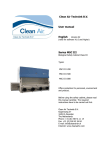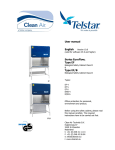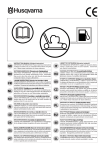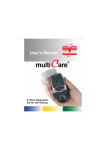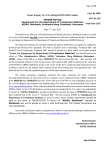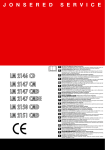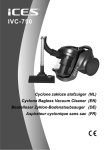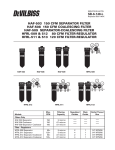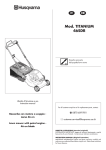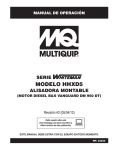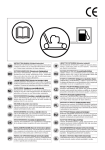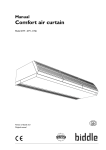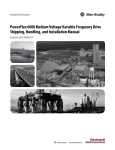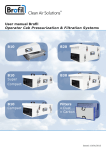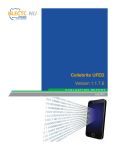Download Clean Air Techniek B.V. User manual English
Transcript
Clean Air Techniek B.V. User manual English Version 5.0 Series CLF Laminar crossflow-cabinet Types: CLF 475 CLF 575 CLF 675 Offers protection for product Before using the cabinet, please read this manual carefully. The required instructions have to be carried out first. Clean Air Techniek B.V. Kuipersweg 37 3449 JA Woerden The Netherlands Phone: +31 (0) 348 41 11 14 Fax: +31 (0) 348 42 26 84 E-mail: [email protected] Internet: www.cleanair.eu Preface Clean Air provides a complete range Laminar Airflow Cabinets for handling of non-hazardous materials, which require a clean particle free environment. The cabinets offer the highest product protection. The horizontal airflow prevents contaminated outside air to enter the workstation's work area, ensuring product protection. Its application is in the field of pharmaceutical industry, biotechnology, pharmacies, hospital and university laboratories as well as tissue culture and electronic laboratories. The CLF is a high-quality product constructed with high-grade components and materials, with new techniques, such as: ̇ Microprocessor control with a LCD display for the interface with the user; ̇ Automatic up speeding fan; when there is increasing resistance in the filter the necessary airspeeds are maintained; ̇ Integrated drain on the backside of the working surface to prevent spilled liquids to leak in to the HEPA filter; ̇ White laminated wooden or stainless steel (304) working surface; ̇ All internal areas of the working space are in line with the effective HEPA filter area, to obtain a laminar flow; ̇ Side windows of safety glass for a good overview. Furthermore the CLF is a service friendly cabinet, produced in The Netherlands. We thank you for buying this cabinet and wish you good times working with this cabinet. Clean Air Techniek B.V. Version table Vers. 5.0 Version: 25-11-09 Date: From serial number: MPE By: Check: Document structure updated Change: ©Copyright 2009 All rights reserved. Nothing from this edition may be copied, or used in an automated database, or made public, either electronic, mechanical, by photocopies, recordings, or in any manner, without preceding written permission of Clean Air Techniek B.V. This also counts for the accompanying figures and/or plans. Clean Air Techniek B.V. is entitled to change parts on each desired moment, without preceding or direct notification of the customer. The content of this user manual can be changed without preceding warning as well. For information concerning maintenance activities or repairs which are not mentioned in the user manual, please contact the service organization. This user manual has been put together with all possible care, but Clean Air Techniek B.V. cannot take the responsibility for possible mistakes in this user manual or for the consequences of it. UM-CLF-XX-EN05.doc 2 CLF Laminar crossflow-cabinet Clean Air Techniek B.V. Index 1 Introduction _______________________________________________ 6 1.1 2 Safety regulations ___________________________________________ 7 2.1 2.2 2.3 2.4 2.5 3 Type plate ___________________________________________________________12 Front panel __________________________________________________________12 Worktop _____________________________________________________________13 Plenum-construction ___________________________________________________13 Crossflow filter ________________________________________________________13 Pre-filter _____________________________________________________________13 Support frame (optional)________________________________________________13 Main power connection _________________________________________________14 Electronics ___________________________________________________________14 Operating panel _______________________________________________________15 FL-lighting ___________________________________________________________15 Fan _________________________________________________________________15 Optional features ______________________________________________________15 Control___________________________________________________ 18 5.1 5.2 5.3 5.4 5.5 5.6 5.7 5.8 5.9 5.10 5.11 5.12 6 Assembly-instruction ___________________________________________________10 Transport instructions __________________________________________________11 Dismantling & Disposal _________________________________________________11 Product description _________________________________________ 12 4.1 4.2 4.3 4.4 4.5 4.6 4.7 4.8 4.9 4.10 4.11 4.12 4.13 5 Use in conformity with regulations _________________________________________7 Modifications and changes to the cabinet____________________________________7 Authorized persons _____________________________________________________7 General safety aspects __________________________________________________8 Explanation user safety symbols ___________________________________________9 Cabinet __________________________________________________ 10 3.1 3.2 3.3 4 CLF __________________________________________________________________6 Using the cabinet______________________________________________________18 Display interface ______________________________________________________18 Starting up the cabinet _________________________________________________19 Locking functions cabinet _______________________________________________20 Power save mode _____________________________________________________21 Turn off _____________________________________________________________21 Control UV (optional)___________________________________________________22 Control sockets (Optional)_______________________________________________22 Menu functions _______________________________________________________23 General Information ___________________________________________________23 Information status cabinet ______________________________________________32 Settings _____________________________________________________________35 Alarms ___________________________________________________ 38 UM-CLF-XX-EN05.doc 3 CLF Laminar crossflow-cabinet 6.1 6.2 7 Periodic maintenance __________________________________________________42 Replacement of the pre-filter ____________________________________________42 Replacing the fluorescent-light (FL light) ___________________________________43 Service contact _______________________________________________________44 Service contract _______________________________________________________44 Testing ______________________________________________________________44 Technical specifications ______________________________________ 45 9.1 9.2 10 Cleaning the installation ________________________________________________41 Cleaning the UV-light (optional) __________________________________________41 Small maintenance and testing ________________________________ 42 8.1 8.2 8.3 8.4 8.5 8.6 9 Flow alarms __________________________________________________________38 Other alarms _________________________________________________________39 Cleaning__________________________________________________ 41 7.1 7.2 8 Clean Air Techniek B.V. Physical surrounding ___________________________________________________45 General specifications __________________________________________________45 Trouble shooting ___________________________________________ 48 Appendix I: Support frame CLF ____________________________________ 49 Appendix II: Replacement of the HEPA-filters ________________________ 50 1. 2. When does a HEPA filter need to be replaced? ______________________________50 replacing the HEPA-filter ________________________________________________50 Appendix III: Efficiency test of the HEPA-filters _______________________ 52 Requirements ______________________________________________________________52 Appendix IV Measuring method air velocities _________________________ 53 Air velocities crossflow _______________________________________________________53 Appendix V: Lay-out boards ______________________________________ 54 Appendix VI: Alarm-test procedure_________________________________ 55 Appendix VII: Stickers __________________________________________ 57 Appendix VIII: Information installed options _________________________ 58 Installed options microprocessor _______________________________________________58 Appendix IX: User code __________________________________________ 61 Activating the user code _____________________________________________________61 Changing the user code ______________________________________________________62 Appendix X: Required specifications ________________________________ 63 Overview of the required specifications__________________________________________63 Appendix XI: Recommended spare parts list _________________________ 64 Appendix XII: TUV Low Pressure Mercury Lamps (Optional) _____________ 65 Appendix XIII: Statement of the agreement for machines _______________ 66 Appendix XIV: Memo____________________________________________ 67 UM-CLF-XX-EN05.doc 4 CLF Laminar crossflow-cabinet Clean Air Techniek B.V. Index________________________________________________________ 68 UM-CLF-XX-EN05.doc 5 CLF Laminar crossflow-cabinet 1 Introduction 1.1 CLF Clean Air Techniek B.V. The laminar crossflow-cabinet CLF has as purpose that the working surface is kept clear of particles by means of a clean laminar crossflow of air. By applying a HEPA-filter (High Efficiency Particulate Air) it is possible to work in this cabinet under conditions which are sterile, dust-free, or aseptic. The cabinet, therefore, offers a product protection. Short description of the CLF • • • • At the top of the cabinet the inflow air is drawn through a pre-filter by a fan. This fan blows the air in the correct proportion to the crossflow HEPA-filter. Because the crossflow air passed through a HEPA-filter (High Efficiency Particulate Air), the working surface is free of particles. The airflow in the workspace is crosswards, thus preventing background air to flow into the class A workspace. The air flow leaves the cabinet by the work opening. Figure 1: Sectional view CLF UM-CLF-XX-EN05.doc 6 CLF Laminar crossflow-cabinet 2 Clean Air Techniek B.V. Safety regulations ATTENTION! Before starting service with the cabinet always ask the responsible person if there is no danger for the service engineer, labor personnel, the laboratory and the surrounding of the cabinet. 2.1 Use in conformity with regulations Personnel that is not properly informed about the safety regulation and/or does not meet the requirements mentioned in §2.3 Authorized persons on page 7, is not allowed to use the cabinet. Improper use of the cabinet is not allowed. 2.2 Modifications and changes to the cabinet In order to operate the cabinet safely changes and/or alterations shall only be made by Clean Air Techniek B.V., or shall be made after consultation with and permission in writing from Clean Air Techniek B.V. If modifications and changes are made on own initiative, without permission from Clean Air Techniek B.V., the parts of the cabinet concerned are no longer covered by the warranty. Clean Air Techniek B.V. cannot be held liable for the consequences of the modifications and the dangers, which might possibly occur as a result. The modifications mentioned here include the connection of the cabinet to an exhaust system. 2.3 Authorized persons Operating the cabinet The cabinet shall only be used by personnel which: ̇ is familiar with the content, regulations and warnings which are mentioned in the user manual; ̇ is familiar with how to operate the cabinet; ̇ is familiar with the start up procedure, the stop procedure and knows how to react in case of emergency; ̇ is familiar with the regulations to keep the safety in all circumstances; ̇ is capable to end a disturbance. Maintenance and repairs general Maintenance shall only be performed by qualified service engineers, who are sufficiently trained by Clean Air Techniek B.V. to: ̇ Estimate and avoid the dangers of the cabinet; ̇ Estimate the consequences of their actions. ̇ Before starting maintenance to the cabinet (mechanical and/or electric) disconnect the power supply. Pay attention to rotating parts, after switching off the cabinet the fans will still rotate for a while. UM-CLF-XX-EN05.doc 7 CLF Laminar crossflow-cabinet Clean Air Techniek B.V. Maintenance and repair of the electrical cabinet Maintenance shall only be performed by professional electro-technical service engineers, who are sufficiently trained by Clean Air Techniek B.V. when: ̇ ̇ ̇ They can estimate and avoid the dangers of the cabinet; They can estimate the consequences of their actions; They are sufficiently informed about the operation of the cabinet and the operation of the subsystems. 2.4 General safety aspects 1. The cabinet shall never be used unless the fan is switched into work mode and there is no alarm. 2. When the cabinet is not used, the cabinet should be switched in to power-save mode or closed/covered, to prevent that dust particles etc. from the room can get into the cabinet. 3. Always try to limit the amount of equipment in the workroom. Each object in the workroom will disturb the pattern of the airflow and a large number of equipment may lead to serious disruptions. 4. It’s is important that the cabinets will be kept clean. Even the smallest contamination which is not visible will be easily forgotten. It is important to clean often the working area, especially the work top. 5. Be careful with flammable liquids such as alcohol. The airflow is in the direction of the person, so be very careful, or even better; prevent to use this kind of liquids. 6. The use of hand gloves and over sleeves is recommended. 7. Always use a chair with the correct height. 8. Transport and installation of the cabinet is only allowed for authorized staff. Please contact the manufacturer or the seller of the products UM-CLF-XX-EN05.doc 8 CLF Laminar crossflow-cabinet 2.5 Clean Air Techniek B.V. Explanation user safety symbols GENERAL DANGER You can harm yourself and others seriously if you do not follow the procedures carefully HIGH VOLTAGE DANGER OF EXPLOSION DANGER BY INDUSTRIAL VEHICLE UM-CLF-XX-EN05.doc 9 CLF Laminar crossflow-cabinet 3 Clean Air Techniek B.V. Cabinet GENERAL DANGER Be careful: high centre of gravity, crossover point. The cabinet must be installed in a safe way. Clean Air Techniek B.V. supplies an optional support frame, which is designed for this purpose. When the cabinet is purchased without a support frame, it is advised to discuss the installation with the supplier. 3.1 Assembly-instruction The cabinet has to be placed on the support frame recommended by the supplier. The assembly needs to be done as specified in instruction underneath. Assembly support frame (Optional) Build the support frame (see also UM-CLF-XX-EN05.doc 10 CLF Laminar crossflow-cabinet Clean Air Techniek B.V. Appendix I: Support frame CLF on page 49 for an explaining drawing): • Mount the support yokes (Pos. 5) to the reinforcement plate (Pos. 6); • Mount the feet support (Pos. 7); • Position the covers (Pos. 4) and adjusting feet (Pos. 3). Placing the cabinet • Place the cabinet right on the forks of a forklift truck or lifting platform; DANGER BY INDUSTRIAL VEHICLE Be careful: Make sure the cabinet cannot slide from the forks. • • • • • Move the cabinet to the correct height and position, perform this action as precise as possible above the support frame; The weight must be equally divided between the both forks and the cabinet must be horizontal levelled; The cabinet should be aligned with the support frame. Mount the cabinet to the support frame by means of the screws. Connect the powerplug to a grounded socket that is easy accessible. In case of maintenance the cabinet must be completely free of voltage. This means that the connector in the socket must be easy to reach, otherwise a main-switch must be mounted between the cabinet and the power supply so that the cabinet can be cut off of the power-circuit. 3.2 Transport instructions Before moving the cabinet make sure the power cable is disconnected of the power supply The cabinet must be transported on a strong solid pallet. After every transport the cabinet must be tested and calibrated. GENERAL DANGER Be careful: High center of gravity, crossover point. 3.3 Dismantling & Disposal For dismantling and disposal follow the next instructions: • See §7.1 Cleaning the installation on page 41; • See §8.2 Replacement of the pre-filter on page 42; • See Appendix II: Replacement of the HEPA-filters on page 50; • Break the unit down into its component parts. You can re-cycle these components parts, dispose of them in accordance with local requirements. For advice or information about dismantling or disposal please contact Clean Air Techniek B.V. UM-CLF-XX-EN05.doc 11 CLF Laminar crossflow-cabinet 4 Clean Air Techniek B.V. Product description Figure 2 Sectional view CLF Partlist: 1. 2. 3. 4. 5. 6. 7. Pre-filter Fan Plenum-construction Front panel + control panel + I/O board HEPA-filter Lighting Worktop 4.1 Type plate On type plate (right upper side) there are instructions that are important for the connection of the cabinet. 4.2 Front panel Behind the front panel (Figure 2, Pos 4) a number of electrical components are mounted. ̇ Operating panel / operating board ̇ Interface board, including fan control To check one of these components, you need to open the front panel. UM-CLF-XX-EN05.doc 12 CLF Laminar crossflow-cabinet 4.3 Clean Air Techniek B.V. Worktop The workroom contains a white laminated wooden or stainless steel (304) worktop (Figure 2, Pos 7). 4.4 Plenum-construction The plenum-construction (Figure 2, Pos 3) equalizes the air trough the crossflow filter. 4.5 Crossflow filter The crossflow HEPA-filter* (Figure 2, Pos 5) has a very high efficiency: Class H14 in accordance with EN1822. After assembling, each filter will be tested separately. Through the service panel on the back the crossflow filter can be reached. *) High Efficiency Particulate Air filter 4.6 Pre-filter The pre-filter (Figure 2, Pos 1) is a filter in the class G3 accordance with EN779. Furthermore the pre-filter will enhance the life span of the HEPA-filter significantly. 4.7 Support frame (optional) For a stable positioning of the cabinet we recommend the use of a support frame. For a good ergonomic work position the use foot support is present. In addition, it is recommended to use an in height adjustable, well disinfectable, chair to optimize the work position. See UM-CLF-XX-EN05.doc 13 CLF Laminar crossflow-cabinet Clean Air Techniek B.V. Appendix I: Support frame CLF on page 49. 4.8 Main power connection The main power connection is positioned on the top of the cabinet. The power cable length is maximum 3 meters and should always be accessible. See technical specifications for details. 4.9 Electronics The electronics (Figure 2, Pos 4) consists of: • Operational print; positioned in the top hood behind the front panel; • Control print, positioned behind the front panel, including: o Fuse holders (see §9.2 on page 46 for fuse-numbers). o Fan control. The control is free adjustable in the range between 0% and 100% o An Air velocity compensating microprocessor regulates the fan speed to compensate for main power fluctuations and filter pollution. o Independent potential free output contact (interface board connector J6). See Interface board on page 54. o Main filter o Light ballast + starter for UV (Option) o Light ballast for FL-light UM-CLF-XX-EN05.doc 14 CLF Laminar crossflow-cabinet Clean Air Techniek B.V. 4.10 Operating panel Figure 3: Operating panel The operating panel (Figure 3, Figure 2, Pos 4) consist of: 1- Display; 2- Function keys (4x); 3- Fixed keys (4x); 4- Signals. 4.11 FL-lighting The Fluorescent-Lighting (Figure 2, Pos 6) is mounted in the Light unit. HIGH VOLTAGE 4.12 Fan The electric driven double suction fan (Figure 2, Pos 2) is maintenance-free. 4.13 Optional features Gas connection This connection is assembled together with a gas tap. Normally, both the inlet and outlet gas connections are hose connections, suitable for hoses with an inner diameter of 10 mm. All connections on the gas supply have to be done with a certified gas hose. After the connection on the gas supply, the gas connections have to be tested on leakage by a certified installer. UM-CLF-XX-EN05.doc 15 CLF Laminar crossflow-cabinet Clean Air Techniek B.V. Positions of the supply connection • The connection, that is located inside the installation, is standard assembled on the worksurface inside the work space of the cabinet. • The connection, that is located outside the installation, is standard assembled in the bottom of the installation. Bunsen burner Recommended to apply is the Fuego Bunsen burner, available at Clean Air Techniek B.V. Positions of the supply connection • The connection is standard through the workopening. Vacuum/ O2/ N2 and compressed air connections These connections are always assembled in combination with a tap. Positions of the supply connection • The connection, that is located inside the installation, is standard assembled in combination with a tap in the worksurface. • The connection, that is located outside the installation, is standard assembled in the bottom of the installation. UV-Radiator The UV radiator is meant for disinfecting the working surface of the cabinet. When the UV-radiator is on, the TL lighting will be switched off. The UV radiator may only be switched on when the work space of the cabinet is entirely closed, this makes sure that the user will not get in contact with UV-C radiation. Block the front aperture (a special night door can be ordered for this purpose). DANGER FOR BURNING Avoid direct contact with UV-C radiation. This causes burns to the skin and eyes. (see §5.7 on page 22). It is also The UV light can be switched on and off on the display possible to adjust the UV disinfection, for each day a certain disinfection period can be defined (see §5.10 on page 24). UM-CLF-XX-EN05.doc 16 CLF Laminar crossflow-cabinet Watch Out! Clean Air Techniek B.V. Do not touch the UV-lamp with the hand and keep the lamp fat free; otherwise the lifetime will decrease. The UV-light must be cleaned with alcohol (70%) regularly (switch off the installation ). See §7.2 on page 41. When the UV is switched on, the UV hour counter counts the lighting period. UV-lamps have, depending on fabricate and type, a limit in effective running hours. Replace the lamp frequently. For more info see Appendix XII: TUV Low Pressure Mercury Lamps (Optional) on page 65. Sockets The sockets are mounted in the working area. They can be operated at the control panel. See “Technical specifications”on page 45 for electrical details. Alternative Options Please contact Clean Air Techniek B.V. for information about alternative options. UM-CLF-XX-EN05.doc 17 CLF Laminar crossflow-cabinet 5 Clean Air Techniek B.V. Control 5.1 Using the cabinet Check if the information on the type plate is corresponding to the main power connection. Connect the cabinet to the main connection by putting the plug into a grounded socket that is easy accessible. 5.2 Display interface Figure 4 Display Interface The operating panel (Figure 3 and Figure 4) consists of: 1. Display; 2. Function keys (4x); 3. Fixed keys (4x); 4. Signals. Display: The display has 4 lines, the lowest line gives the description of the function key underneath. I II Cabinet switched off – not safe Monday 11:06:33 III IV MENU Socket=Off Fixed keys: Lighting ON/OFF Work mode fan ON/OFF Power save mode fan ON/OFF Acknowledge / Enter UM-CLF-XX-EN05.doc 18 CLF Laminar crossflow-cabinet Clean Air Techniek B.V. Function keys: The function of keys 1, 2, 3 and 4 is variable. In the last line of the display the function is shown. Signals: Alarm: Confirmed alarm state Alarm, flashing (along with acoustic signal): Actual alarm UV: Indication UV-light switched on OK: Safe user mode All equipment and, if possible, all materials required for working with the cabinet need to be placed into the installation before starting up the cabinet. High equipment or objects can be placed in the working space by sliding or hinging the window upwards. Be careful: keep the safety regulations in consideration. 5.3 Starting up the cabinet The lighting of the display will light up. The alarm indicator light is red 1 . • Connect the power cable. Cabinet switched off – not safe Monday 11:06:33 MENU The fan starts. Cabinet is in start up mode. • Socket=Off Push button . Starting to work mode – not safe Monday 11:06:33 2 3 The alarm indicator light is red . There is an acoustic alarm. If the cabinet is secured with a user code, this code has to be entered first. The default code is 0001. The user code can be changed by the user, see Appendix IX: User code on page 62. 4 The light will switch on. When the fan has reached the right airspeed, the alarm indicator will disappear. 5 The following display will be shown. MENU • • Socket=Off To acknowledge this alarm, push button Enter actual user code. . User code: 0000 (Enter code) A = Enter >> + - • Confirm the code with button • Push button Esc . . Cabinet in work mode – safe Monday 11:06:33 MENU Socket=Off However, the cabinet must operate for minimally 15 minutes more, before the cabinet is ready to work with. UM-CLF-XX-EN05.doc 19 CLF Laminar crossflow-cabinet Clean Air Techniek B.V. If the air speeds still are not right, the alarm will sound again. To see what is wrong: Starting to work mode – not safe Monday 11:06:33 MENU • Socket=Off Push button (Menu). A => Hour counter information B => Status cabinet C => Settings A • 6 Push button B C Esc (B). Information Status Cabinet A = Enter => • Push button <= . Cabinet: Work mode Airflow 0.36 < => See § 5.11 on page 32 for more info about this menu. • Esc < 0.54 m/s <= Back to starting menu: button Esc (Esc). 5.4 Locking functions cabinet (Only when the locking function is activated) The cabinet will lock its functions When, within these 5 minutes, an arbitrary button is pushed 1 after being 5 minutes in work (e.g. lighting) the timer starts counting again. position. From this moment the fanCabinet in work mode - Safe buttons are not available Monday 11:06:33 anymore. Cabinet is locked with pincode 2 The user code has to be entered to make the functions available MENU Socket=Off again. See Appendix IX: User code on page 62. If the cabinet has to be locked • Push button for 5 seconds 3 immediately after entering the After 3 seconds, two short beeps will be heard as an code: acknowledgement the cabinet has been locked. To unlock the cabinet, the user See Appendix IX: User code on page 62. 4 code has to be entered again. UM-CLF-XX-EN05.doc 20 CLF Laminar crossflow-cabinet Clean Air Techniek B.V. 5.5 Power save mode When not using the cabinet for a short period of time, put it in the power save mode. The fan will run at half speed to save energy (synonyms for power save mode are standby mode or night mode). Power save mode • Push button . When the cabinet is locked enter the user code. 1 The fan runs at half speed. There is an acoustic alarm. Cabinet in power save mode – not safe Airflow to low MENU Switch off procedure Socket=Off • To acknowledge this alarm push button • With the next push on the power save button cabinet enters the switch off procedure. . the Cabinet switched off – Not Safe 2 Monday 11:06:33 MENU Work mode • Socket=Off . Push button Cabinet in work mode - Safe 3 Monday 11:06:33 MENU 5.6 Socket=Off Turn off Remove all materials en accessories from the working area. Remove all spilled liquids and other parts in a responsible manner, according to the regulations. The display will ask for the user 1 code (only when the user code is • activated). The fan will be switched off. • to turn off the cabinet. Push button Enter the user code and push button . Cabinet switched off – Not Safe 2 Monday 11:06:33 MENU UM-CLF-XX-EN05.doc Socket=Off 21 CLF Laminar crossflow-cabinet Clean Air Techniek B.V. 5.7 Control UV (optional) The UV-function is only visible if this option is installed. If not installed the function at the display is invisible. The UV-function may only be switched on with a completely closed workspace. See UV-Radiator on page 16) This prevents direct contact on the skin or eyes of the personnel. Switching UV on Make sure that the entire workspace is closed. Cabinet must be switched off or 1 in power safe mode. The display shows “UV=Off”. The UV will switch on. The display shows “UV=On”. • Push button (UV=Off). Cabinet switched off – Not Safe 2 UV switched on MENU Socket=Off UV=On Switching UV off The UV will switch off. The display shows “UV=Off”. • Push button (UV=On). Cabinet switched off – Not Safe 3 UV switched off MENU Socket=Off UV=Off FL (Fluoresced lamp)-Lighting and UV cannot be switched on both at the same time. As a safety precaution, one of them will automatically switch off. 5.8 Control sockets (Optional) The sockets can always be switched on and off. If the cabinet is switched off, the sockets are automatically switched off. Also if the cabinet is switched from work mode into power save mode, the sockets are automatically switched off. See technical specification (see §9.2 General specifications on page 45) for maximum voltage and current (fuses). Switching socket on Cabinet in work mode. See §5.3 Starting up the cabinet 1 on page 19. Cabinet in work mode - Safe Monday 11:06:33 MENU UM-CLF-XX-EN05.doc Socket=Off 22 CLF Laminar crossflow-cabinet The display shows: Socket=On. Power of socket is switched on. Clean Air Techniek B.V. • Push button (Socket=Off). Cabinet in work mode - Safe 2 Monday 11:06:33 Socket switched on MENU Socket=On Switching socket off The display shows: Socket=Off. Power of socket is switched off. • (Socket=On). Push button Cabinet in work mode - Safe 3 Monday 11:06:33 Socket switched off MENU Socket=Off 5.9 Menu functions From the main menu you can go to: § 5.10 General information, § 5.11 Information about the status of the cabinet and § 5.12 information about the settings. 5.10 General Information In • • • • • general information more details are given about: Hour counter information and reset (FL, UV, Timer) Set up 7 days clock UV Set up socket 7 days clock Set up cabinet 7 days clock Set Actual time Hour counter information and reset (FL, UV, Timer) Cabinet in work mode. See §5.3 Starting up the cabinet 1 Cabinet in work mode - Safe Monday 11:06:33 on page 19. MENU • Push button (Menu). A => Hour counter information B => Status cabinet C => Settings 2 A • UM-CLF-XX-EN05.doc Socket=Off Push button B C Esc (A). 23 CLF Laminar crossflow-cabinet Clean Air Techniek B.V. Hour counter display shows. Hour counter information 3 A = Enter => Hour counter information shows. • 4 <= Push button Esc . Cabinet in use: 0:33 A: FL in use: B: UV in use: 0:22 0:00 => Reset A Reset B Esc *FL= Fluoresced lamp There are three different possibilities, see 5a, 5b and 5c. Reset all timer and clock • adjustments? (=>). Push button Reset hour counter and clock 5a => Reset FL counter? 5b Reset UV counter? 5c Reset • Push button • Push 2x button • Push button (reset A). • Push button (Reset). • Push 2x button • Push button (reset B). • Push button (Reset). • Push 2x button Esc (Reset). (Esc) for starting menu. (Esc) for starting menu. (Esc) for starting menu. Set up 7 days clock UV Cabinet in work mode. See §5.3 Starting up the cabinet 1 Cabinet in work mode - Safe Monday 11:06:33 on page 19. MENU • UM-CLF-XX-EN05.doc Push button Socket=Off (Menu). 24 CLF Laminar crossflow-cabinet Clean Air Techniek B.V. A => Hour counter information B => Status cabinet C => Settings B A • Push button C Esc (A). Hour counter information A = Enter => • <= Esc (=>). Push button Set up for 7 days clock Set up for 7 days clock UV shows. A = Enter => • <= Push button Esc . UV-Function: Disabled Timer There are three ways to set the UV: - 2a. Timer - 2b. 7 days clock - 2c. Disable Timer The timer sets a period until the UV turns off. 2a Clock (7 days clock) With the clock function, for each day of the week, you can set a variable period for the UV to be switched on. Keep in mind, you 2b have to set the starting hour and starting minute for each day separately! For detailed information regarding programming this menu, see UM-CLF-XX-EN05.doc Clock Disable Esc • Push button (Timer), to set up the timer. • Push button (Change), to change the time. • The value can be changed by pushing button (>>), (+) or (-). • Acknowledge the setting with button • Push 2x button • Push button (Clock), to set up the 7 days clock. • Push button ending time. (Change), to change starting time en • The value can be changed by pushing button (>>), • (+) or . (Esc) for starting menu. (-). Acknowledge the setting with button . 25 CLF Laminar crossflow-cabinet §5.9 Set up 7 days clock UV on page 24 . Clean Air Techniek B.V. • Push 2x button (Esc) for starting menu. See also the Example on page 26. Disable By pushing on “Disable” the UV can only be turned on and off 2c manually. • Push button • Push 2x button (Disable), to set the UV manually. (Esc) for starting menu. Please select not only a starting time, but also an ending time for every programmed day. Otherwise the UV will stay on until 00:00 h and only then turn off. See also the Example on page 26. Example Programming the 7 days clock UV will be given as an example. Switch on the UV Tuesday evening 22.00 and switch off the UV Wednesday morning 06.00. (See §5.9 Hour counter information and reset (FL, UV, Timer) point 5a on page 23, for deleting all Hour counter programmed information). Cabinet in work mode. Cabinet in work mode - Safe See §5.3 Starting up the cabinet Monday 11:06:33 1 on page 19. MENU • UM-CLF-XX-EN05.doc Push button Socket=Off (Menu). 26 CLF Laminar crossflow-cabinet Clean Air Techniek B.V. A => Hour counter information B => Status cabinet C => Settings B A • Push button C Esc (A). Hour counter information A = Enter => • <= Esc (=>). Push button Set up UV 7 days clock Set up for 7 days clock UV shows. Function: Clock A = Enter => • Push button <= Esc . UV-Function: Disabled Timer Set up the UV 7 days clock • Push button clock. Clock Disable Esc (Clock) for setting up the UV 7 days Saturday UV on: 00:00 UV off: 00:00 A = Enter Change • 2 Push button end time. Esc (Change) for changing the start and Saturday UV on: 00:00 UV off: 00:00 A = Enter >> • 3 Set up UV starting time Tuesday evening 22.00. -Change start day, -Change start hour (22.00), -Change start min (22.00), -Change stop hour (00.00), UM-CLF-XX-EN05.doc • + - Esc The value can be changed by pushing button (+) or (-). (>>) , Saturday has to be changed into Tuesday, UV starting time at 22.00 and UV off at midnight 00.00. The display shows: 27 CLF Laminar crossflow-cabinet Clean Air Techniek B.V. -Change stop min (00.00). Tuesday UV on: 22:00 UV off: 00:00 A = Enter >> • Set up UV switching off on Wednesday morning 06.00. -Change stop day, -Change start hour (00.00), -Change start min (00.00), -Change stop hour (06.00), -Change stop min (06.00). + - Acknowledge the setting with button Esc . Hour counter information A = Enter => • • • Push button <= Esc (=>), then button , then button (Clock) and then button (Change). Tuesday has to be changed into Wednesday, UV starting time at midnight 00.00 and UV off at 06.00. The display shows: Wednesday UV on: 00:00 UV off: 06:00 4 A = Enter >> • + - Acknowledge the setting with button Esc . Hour counter information A = Enter => Check of programmed UV Clock <= Esc • Push 2x button (Esc) for starting menu. • Push 3x button (Menu). • Push button . • Push button (day by day). (Clock), for checking the UV clock Wednesday UV on: 00:00 UV off: 00:00 5 Change • Push button programmed. Esc (Change), to see what has been Wednesday UV on: 22:00 UV off: 00:00 A = Enter >> UM-CLF-XX-EN05.doc + - Esc 28 CLF Laminar crossflow-cabinet Clean Air Techniek B.V. • • The value can be checked by pushing button (>>) change day. Every days program can be controlled by pushing • (+) or (-). , only use 2x button Important! Don’t touch (Esc) to go back to the main menu. Set up socket 7 days clock Cabinet in work mode. See §5.3 Starting up the Cabinet in work mode - Safe Monday 11:06:33 cabinet on page 19. MENU • Socket=Off Push button (Menu). A => Hour counter information B => Status cabinet C => Settings A • Push button B C Esc (A). Hour counter information A = Enter 1 => • <= Push 2x button Esc (=>). Set up socket 7 days clock Function: disabled Set up display for socket 7 days clock shows. A = Enter => • <= Esc Acknowledge the setting with button . Socket function: Disabled Timer UM-CLF-XX-EN05.doc Clock Disable Esc 29 CLF Laminar crossflow-cabinet 2 Clean Air Techniek B.V. There are three ways to set the sockets: - Timer - 7 days clock - Disable See §5.9 Set up 7 days clock The timer function needs to be activated first, otherwise the sockets will not switch on. UV on page 24 and further. See also the Example for programming the UV-lamp on page 26. Set up cabinet 7 days clock With this menu it is possible to program an automatic switch action on of the cabinet. It is however not possible to switch off the cabinet itself automatically! Cabinet in work mode. Cabinet in work mode - Safe See §5.3 Starting up the Monday 11:06:33 cabinet on page 19. MENU • Socket=Off (1x Menu, 1 x A and 3x =>), Push 5x button Setting cabinet 7 days clock Function: disabled 1 A = Enter => • <= Esc Acknowledge the setting with button . Tuesday Cabinet to work mode at 0.00 Disable Change Esc Disable • Push button settings. (Disable), to reset all previous Change days: • Push button (Change), to change the day. 2 Tuesday Change day Cabinet to work mode at 0.00 A = Enter 3 >> • + - The value can be changed by pushing, Esc (+) or (-). Change hours: 4 UM-CLF-XX-EN05.doc • Push button (>>) to change the time. 30 CLF Laminar crossflow-cabinet Clean Air Techniek B.V. Change hours Cabinet to work mode at 10.00 A = Enter >> • - Esc The value can be changed by pushing button (+) (-). or Change minutes: + Thursday Cabinet to work mode at 10.00 => • 5 + Push button - Esc (=>) again, to change the minutes. Change minutes Cabinet to work mode at 10.30 A = Enter >> • • 6 - Esc (+) The value can be changed by pushing button (-). or • Acknowledge the setting. + Acknowledge the setting with button . Push 2x button (Esc) for starting menu. For more days / hours / minutes, walk again through the menu and confirm each time. • Set up actual time Cabinet in work mode. See §5.3 Starting up the cabinet 1 on page 19. Cabinet in work mode - Safe Monday 11:06:33 MENU Set up actual time: • Socket=Off (1x Menu, 1 x A and 4x =>). Push 6x button Set up actual time Monday 11:06:33 A = Enter => 2 • Set up display the actual day shows. + - Acknowledge the setting with button Esc . Set up actual time change day Monday 11:06:33 A = Enter >> • UM-CLF-XX-EN05.doc Push button + - Esc (=>). 31 CLF Laminar crossflow-cabinet Clean Air Techniek B.V. • The day can be changed by pushing button (+) or (-). Change hours/min/sec: 3 Set up display set up the actual time shows. Acknowledge the settings 4 • • (>>) again. Push button The hours/min/sec can be changed by pushing button (+) or • (-). . Acknowledge the setting with button (Esc) for starting menu. • Push 2x button Actual time appears when there are no more alarms. In case of power failure, actual time is kept in memory for one month. 5.11 Information status cabinet In In • • • • this menu the settings of the cabinet can be checked to inform service personnel. information status more details are given about: Actual velocities, alarm setting and fan settings Information about the installed options (Sockets, UV) Information about Options relays Information about Analog inputs (only visible when option is activated) Cabinet in work mode. See §5.3 Starting up the cabinet Cabinet in work mode - Safe Monday 11:06:33 on page 19. MENU • 1 Socket=Off Push button (Menu). A => Hour counter information B => Status cabinet C => Settings B A • Status Display: Push button C Esc (B). Information status cabinet A = Enter 2 => <= Esc Status display shows Status Information : Airflow 0.36 < 3 < 0.54 Example with colours) • Push button Cabinet: Work mode Airflow 0.36 < => UM-CLF-XX-EN05.doc . <= < 0.54 Esc 32 CLF Laminar crossflow-cabinet Clean Air Techniek B.V. Status information cabinet shows (see example). • Middle numbers are the actual air speeds (yellow); • Left and right numbers are the set up alarm borders (red). Information fan shows • Push button (=>). Information fan setting (0-1000) Off: 0 Work mode: 520 4 => 1110011 Power save: Actual: 350 537 <= Esc The seven-digit number in the upper right corner is only meant for service aims. • Push button (Esc) for starting menu. Information about the installed options (The display only shows when the options are installed) Cabinet in work mode. Cabinet in work mode - Safe See §5.3 Starting up the cabinet Monday 11:06:33 on page 19. MENU • Push button Socket=Off (Menu). 1 A => Hour counter information B => Status cabinet C => Settings A • Push button B C Esc (B). Information status cabinet A = Enter => 2 • Information about the installed options is given (example): Push button <= Esc (=>). Installed Options 1 Socket present, UV inst. 1 flowsens => <= Option Esc From here there are 3 possibilities (examples): - 3a. Screen I - 3b. Screen II - 3c. Screen III UM-CLF-XX-EN05.doc 33 CLF Laminar crossflow-cabinet Clean Air Techniek B.V. Options Screen I Starting up from Step 2 Installed Options 1 Socket present, UV inst. 1 flowsens => <= Option Esc Installed options display shows. • 3a Push button (Option). Option Exhaust fan Relays #C2 Esc For explanation codes see Appendix VIII: Information installed options on page 52 . • Options Screen II Starting up from Step 2 (Esc) for starting menu. Push 2x button Installed Options 1 Socket present, UV inst. 1 flowsens => <= Option Esc Installed options display shows. • 3b Push button (=>). Installed Options Relays #A1 Relays #B1 => Options Screen III (Display only appears when analogue options are installed) Starting up from Step 2 <= Esc • For explanation codes see Appendix VIII: Information installed options on page 52. • Push button • Push 2x button (Esc) for starting menu. (=>). Analog inputs AD1 5.0 C AD2 1.0 µM 3c => A = Enter => => => For explanation codes see Appendix VIII: Information installed options on page 58. • UM-CLF-XX-EN05.doc Push button (Esc) for starting menu. 34 CLF Laminar crossflow-cabinet Clean Air Techniek B.V. 5.12 Settings In • • • • • • settings more details are given about: Preparations for disinfection Activating the user code Factory adjustments Testing of alarms Change the user code Change language Disinfection (Not applicable for this type of cabinet) Cabinet in work mode. See §5.3 Starting up the cabinet Cabinet in work mode - Safe Monday 11:06:33 on page 19. MENU 1 Socket=Off • Switch off the cabinet with button • Push button . (Menu). A => Hour counter information B => Status cabinet C => Settings B A • Push button • Push button C Esc (C). . Preparations for disinfection 0000 (Enter code) A = Enter 2 => • + Push button - Esc (Esc) to leave the disinfection. Activating the user code See Appendix IX: User code on page 61. Factory adjustments Cabinet in work mode. See §5.3 Starting up the cabinet Cabinet in work mode - Safe Monday 11:06:33 1 on page 19. MENU Factory adjustments: 2 UM-CLF-XX-EN05.doc Socket=Off • Push button (Menu). • Push button (C). • Push 2x button (=>). 35 CLF Laminar crossflow-cabinet Clean Air Techniek B.V. • • . Push button Enter the code for "Factory adjustment" (authorized personnel only). Factory adjustment 0000 (Enter code) >> + - Esc Factory adjustment display . • Push button shows. Factory settings can be changed here (authorized Factory adjustments personnel only). See service Version: X.X xxxxxx IO: VX.XX OPT: VX.X manual for more information. A = Enter (Version: X.X =version of Display board, I/0: VX.XX= version of IO >> + Esc board, OPT: VX.X = version option board) • Push button (Esc) for starting menu. Testing of alarms For service purposes only! More information given in Appendix VI: Alarm-test procedureon page 55. Cabinet in work mode. Cabinet in work mode - Safe See §5.3 Starting up the cabinet Monday 11:06:33 1 on page 19. MENU Socket=Off • Push button • Push 3x button • Push button 2 Testing of alarms display shows: and (C). . . Testing of alarms 0000 (Enter code) A = Enter >> • 3 For service purposes only! + - Esc Enter service code. The various values of the fan and velocities are shown on the display. In case of interference, inform you service organization. Change the user code See Appendix IX: User code on page 61. UM-CLF-XX-EN05.doc 36 CLF Laminar crossflow-cabinet Clean Air Techniek B.V. Change language To change the language, switch off the cabinet and switch off all functions. Then the language can be changed and confirmed. As confirmation the 3 LED’s (right) light up for 1 second and 2 short beeps will sound. The cabinet will be switched on automatically. Cabinet in work mode. Cabinet in work mode - Safe See §5.3 Starting up the cabinet Monday 11:06:33 1 on page 19. MENU Change the language 2 Socket=Off • Push button (Menu). • Push button (C). • Push 5x button • Push button (=>). . ) and Conditions: The fan has to be switched off (push sockets and FL-light must be switched off. Taal Language Sprache Engels English Englisch A = Enter Change UM-CLF-XX-EN05.doc • Push button • Push button Esc (Change) to change the language. . 37 CLF Laminar crossflow-cabinet 6 Clean Air Techniek B.V. Alarms Figure 5 Operating panel When there is an alarm situation the alarm indicator flashes red signal. The safe working conditions are no longer granted. and there is an acoustic Push button for giving an acknowledgement that the user has seen the alarm. The acoustic signal will mute, the alarm indicator will (always) keep on burning. Before acknowledging the alarm, the user code must be entered (only when the user code is activated). An acknowledged alarm (with button A) shall be repeated every 7 minutes, as long as the alarm situation continues. The buzzer has a SPL, sound pressure level, of at least 10 dB (A more than the sound pressure of the working cabinet. See Appendix X: Required specifications on page 63. GENERAL DANGER Make sure that there are no alarm situations during the use of the cabinet. Never work with a cabinet with activated alarm signals. The different types of alarm signals will be discussed in the following chapter. 6.1 Flow alarms If one of the following alarms occurs and no apparent cause can be found, the service department has to be contacted. They will ask for the status of the cabinet, which helps to find possible causes (see §5.11 Information status cabinet on page 32). Flow too low Airflow too low Figure 6 Product protecting crossflow is too low. UM-CLF-XX-EN05.doc 38 CLF Laminar crossflow-cabinet Clean Air Techniek B.V. Product protection becomes less, there is a chance that aerosols from the outside go into the working area. Flow too high Airflow too high Figure 7 Product protecting crossflow is too high. Product protection stays intact. 6.2 Other alarms Other alarms are: Fan failure Fan failure Figure 8 Most likely the fuse is broken. Replace it with a new one. If the alarm is still there, contact your service organization. To reset this alarm you must disconnect the power plug from the main voltage. Communication error Communication error Figure 9 Contact your service organization. Overview possible alarms No alarm Flow too low Flow too high Yes No Yes Product protection: Table 1: Alarm situations in work position Procedure in case of alarms In case the alarm is still present: The cabinet goes into the saving position. Stop working, and push button or the standard operation procedure has to be followed. UM-CLF-XX-EN05.doc 39 CLF Laminar crossflow-cabinet Read the alarms from the display. Contact your service organization. Clean Air Techniek B.V. Cabinet in work mode -Not Safe Monday 11:06:33 MENU Socket=Off Working with the cabinet is not possible anymore. UM-CLF-XX-EN05.doc 40 CLF Laminar crossflow-cabinet 7 Clean Air Techniek B.V. Cleaning Only the responsible safety officer (safety officer or the responsible examiner) can decide if this procedure is valid or not. Additional standard operation procedures can be necessary. 7.1 Cleaning the installation The installation has to be cleaned regularly. Preferably, each time after the installation has been used. Diluted disinfectants may be used. In most cases, hot water with a cleaning agent will be sufficient. Chlorine containing cleaning agent is not recommended, because even small concentrations chlorine may result in an oxidizing effect on the material of the installation. It is important to clean the worktop (see § 4.3 on page 13) regularly. A 1% solution of Natriumdodecylsulfat * (SDS-solution CAS-no. 151-21-3) in demineralised water could be applied for cleaning. Remove the waste and place it in an appropriate container. *) Literature: See Mallinckrodt J.T. Baker data sheet: SDS is MSDS number No S3670 Mallinckrodt Baker Inc. 222 Red School Lane Phillipsburg, NJ 08865 Procedure for cleaning the installation Never clean a used installation without precaution (for instance disinfection) ̇ ̇ ̇ ̇ ̇ ̇ ̇ Switch the installation in the working mode (see §5.3 Starting up the cabinet on page 19); Put on gloves; Clean the surface with the cleaning-solution on a tissue ; Repeat this action with a new tissue; Clean the surface with a moist cloth; Repeat this action; Dry the surface with a paper tissue. 7.2 Cleaning the UV-light (optional) Never clean a used installation without precaution (for instance disinfection) DANGER FOR ELECTROCUTION The UV-light must be cleaned regularly with alcohol (70%). Put on gloves and switch of the cabinet and let the UV-light cool down before cleaning. After cleaning the UV-light tube must be dried before using it. UM-CLF-XX-EN05.doc 41 CLF Laminar crossflow-cabinet 8 Clean Air Techniek B.V. Small maintenance and testing BE CAREFUL!! Before starting service with the cabinet a written declaration “that the cabinet is decontaminated” must be present. The responsible person (laboratory supervisor) will decide if the cabinet has to be decontaminated so that when servicing the installation and the HEPA-filters there is no danger for the service engineer, labour personnel, the laboratory and the surroundings of the cabinet. 8.1 Periodic maintenance A periodic maintenance has to take place regularly. To a certain extent, this depends on the frequency of use of the cabinet. Contact your service organization for advice. Guideline for testing and maintenance given Clean Air Techniek B.V. is every 12 months at least. ̇ ̇ ̇ ̇ ̇ Validate the system on safety; Check for correct functioning of the electrical system; Check the HEPA filter for efficiency and leakage; Verification/calibration of the assembled air speed sensor(s); Check and adjust the alarm system. 8.2 Replacement of the pre-filter (See 4.6 Pre-filter on page 13) Supplies needed: ̇ ̇ ̇ Plastic bag (minimum measurement 75x50 [cm] with closure); Two pair of gloves; Tape. Procedure: ̇ ̇ ̇ Switch off the installation; Put on the gloves; Fold the edge of the plastic bag ±10 cm; ̇ Figure 10 Folding the edge of the bag ±10 cm UM-CLF-XX-EN05.doc 42 CLF Laminar crossflow-cabinet Clean Air Techniek B.V. Figure 11 Positioning the left hand in the plastic bag ̇ ̇ ̇ ̇ ̇ ̇ ̇ ̇ ̇ Pull the pre-filter towel with your right hand; Put the filter into the plastic bag; Fold back the edge of the plastic bag, not touching the inner side of the plastic bag; Press the air out of the bag; Seal the plastic bag airtight; Remove the plastic bag and place it in an appropriate container; Put on new gloves; Place a new pre-filter towel; Remove the gloves and put them in the appropriate container. 8.3 Replacing the fluorescent-light (FL light) When an FL light needs to be changed, switch off the power of the installation. The upper front panel needs to be opened. Unscrew the nuts of the coverplate.The transparent light plate needs to be removed in to the workarea. Replace the FL tube for a new one (see Figure 12). Reposition all parts on the installation. DANGER FOR ELECTROCUTION Figure 12 Position of the FL-tube UM-CLF-XX-EN05.doc 43 CLF Laminar crossflow-cabinet Clean Air Techniek B.V. 8.4 Service contact For advice or any technical questions please contact your service organisation. Please refer to the following items: • Type, Class, Project number and Serial number mentioned on the type plate (for the position of the type plate see page 12 and page 57); • Version number of the software used in the cabinet. Software Version Cabinet in work mode. See §5.3 Starting up the cabinet Cabinet in work mode - Safe Monday 11:06:33 1 on page 19. MENU Software version: 2 Socket=Off • Push button (Menu). • Push button (C). • Push 2x button (=>). Factory Adjustments Version: X.X >> xxxxx + I/O: VXXXX - OPT: VX.X Esc 8.5 Service contract For information and orders concerning service or service contracts please contact Clean Air Techniek B.V. 8.6 Testing Recommended tests for first installation or after changing the HEPA filters are: - Velocity tests (see Appendix IV Measuring method air velocities on page 53); - Filter Integrity tests (see Appendix III: Efficiency test of the HEPA-filters on page 52); - Alarm tests (see Appendix VI: Alarm-test procedure on page 55). Recommended tests after installing with a regular interval are: - Velocity tests (see Appendix IV Measuring method air velocities on page 53); - Filter Integrity tests (see Appendix III: Efficiency test of the HEPA-filters on page 52); - Alarm tests (see Appendix VI: Alarm-test procedure on page 55). UM-CLF-XX-EN05.doc 44 CLF Laminar crossflow-cabinet Clean Air Techniek B.V. 9 Technical specifications 9.1 Physical surrounding Transport physics Surrounding temperature Surrounding temperature (max 24 [h]) Humidity In use physics Surrounding temperature Humidity (not condensed) 9.2 CLF 475 CLF 575 CLF 675 -25 tot 55 -25 tot 55 -25 tot 55 -25 tot 75 -25 tot 75 -25 tot 75 20 tot 90 20 tot 90 20 tot 90 CLF 475 CLF 575 CLF 675 [°C] 15 tot 30 15 tot 30 15 tot 30 [%] 30 tot 80 30 tot 80 30 tot 80 CLF 475 CLF 575 CLF 675 [°C] [°C] [%] General specifications Dimensions Front aperture (lxh) Outer meas. (without support frame (lxhxd) Height including. Support frame 810 [mm] Interior dimensions (lxhxd) [mm] 1190 x 730 1495 x 730 1800 x 730 [mm] 1290 x 1350 x 890 1595 x 1350 x 890 1900 x 1350 x 890 2082 2082 2082 Working area (lxd) Mass [mm] 1190 x 730 x 580 1190 x 540 1495 x 730 x 580 1495 x 540 1805 x 730 x 580 1800 x 540 225 270 325 CLF 475 CLF 575 CLF 675 [mm] [mm] [kg] Filter Pre-filter (EN 779) Crossflow filter [mm] G3 G3 G3 [mm] HEPA 12P7 HEPA 15P7 HEPA 18P7 CLF 475 CLF 575 CLF 675 Performance [dB A] Sound level <58 <58 <54 (according to ISO 11201) [m/s] Average crossflow speed (in 0,45 ±0,05 *1 0,45 ±0,05 *1 0,45 ±0,05 *1 work mode) [m/s] Average crossflow speed (in 0,20 ± 0,05 0,20 ± 0,05 0,20 ± 0,05 standby mode) [m3/h] 1400 1800 2150 Airflow (work mode) +/-10% 1 * As where no individual measurement should differ more than 20% from the mean. All measurements must in between 0,36 m/s and 0,54 m/s. UM-CLF-XX-EN05.doc 45 CLF Laminar crossflow-cabinet Electrics Power connection Needed main fuse box security J6: Alarm, potential free contact Electrical insulation Electrical safety IEC 61000-4-11 Installation cat. Power sockets Power consumption in standby mode (with light switched off) excl. maximum power socket Power consumption in work mode (with light switched on) excl. maximum power socket Power consumption in work mode (with light switched on) incl. maximum power socket Power consumption in max mode fan (with light switched on) excl. maximum power socket Power consumption in max mode fan (with light switched on) incl. maximum power socket Lighting TL-High output Color Diameter Length Power Intensity (mean) Fuses I/O board F1: PCB; 24 [V] F2: Option F3: Lighting F4: UV F6: Socket 1 F7: Fan F8: PCB F9: PCB UM-CLF-XX-EN05.doc Clean Air Techniek B.V. CLF 475 CLF 575 CLF 675 [V] [Hz] [A] 230 +/- 5% 50 16 230 +/- 5% 50 16 230 +/- 5% 50 16 [V] [A] Max. 48 Max. 1 Class 1 Max. 48 Max. 1 Class 1 Max. 48 Max. 1 Class 1 Class A II Class A II Class A II Umax.[V] Imax [A] Pmax.[W] 230 3,15 725 230 3,15 725 230 3,15 725 P [J/s,W] I [A] 373 1,62 460 2,0 465 2,02 Pnom [J/s,W] Inom. [A] 708 3,08 805 3,5 1000 4,35 Pnom [J/s,W] Inom. [A] 1433 6,23 1530 6,6 1725 7,5 P max [J/s,W] Imax.[A] 980 4,26 1383 6,0 1427 6,2 Pmax [J/s,W] Imax.[A] 1705 7,41 2108 9,16 2152 9,35 CLF 475 CLF 575 CLF 675 2x 2x 2x white white white [mm] Ø26 Ø26 Ø26 [mm] 892 1198 1500 [W] 30 36 58 > 900 > 900 > 900 CLF 475 CLF 575 CLF 675 [A] T 0,5 0,5 0,5 [A] T 3,15 3,15 3,15 [A] T 1,6 1,6 1,6 [A] T 0,5 0,5 0,5 [A] T 3,15 3,15 3,15 [A] T 8 8 8 [A] T 1,6 1,6 1,6 [A] T 1,6 1,6 1,6 [Lux] 46 CLF Laminar crossflow-cabinet Clean Air Techniek B.V. Options: UV Type Power Length UV-wave Diameter Length Bunsen burner Voltage Power [W] CLF 475 CLF 575 CLF 675 UV-C UV-C UV-C 30 30 30 [nm] 253 253 253 [mm] Ø 28 Ø 28 Ø 28 [mm] 892 892 892 CLF 475 CLF 575 CLF 675 [V] DC 9 9 9 [W] 2 2 2 See also Appendix X: Required specifications on page 63 and Appendix XI: Recommended spare parts list on page 64. UM-CLF-XX-EN05.doc 47 CLF Laminar crossflow-cabinet 10 Clean Air Techniek B.V. Trouble shooting Fault Cause No power on socket of the cabinet Socket is not activated Remedy Activate socket on display push on Fuse is broken UV button is not visible on display FL-light is not working Cabinet is locked UM-CLF-XX-EN05.doc Replace the fuse UV equipment is not installed x Option UV is not programmed UV option has to be programmed please contact your service organization Turn the FL-light slightly Contacts of the FL are not locking in the power connections UV light is on User code must be entered Switch of the UV light Enter the user code (or de-activate the user code see § 5.12 Change the user code on page 36) 48 CLF Laminar crossflow-cabinet Clean Air Techniek B.V. Appendix I: Support frame CLF For every type of cabinet from CLF-series a specific support frame is available. Figure 13 Example of a support frame UM-CLF-XX-EN05.doc 49 CLF Laminar crossflow-cabinet Clean Air Techniek B.V. Appendix II: Replacement of the HEPA-filters BE CAREFUL!! Before starting service with the cabinet a written declaration “that the cabinet is decontaminated” must be present. The responsible person (laboratory supervisor) will decide if the cabinet has to be decontaminated so that when servicing the installation and the HEPAfilters there is no danger for the service engineer, labour personnel, the laboratory and the surroundings of the cabinet. Clean Air Techniek B.V. strongly recommends special trained technicians to carry out filter exchange. Certified service organizations are recommended. At all times keep to the written procedures in this manual! 1. When does a HEPA filter need to be replaced? Under normal circumstances the serviceable life time of a HEPA filter is several years (mostly between 5 and 10 years). The filter should be replaced whenever the air velocity and/or the filter Integrity are no longer in compliance with the required specifications. The cabinet has a microprocessor that is automatically regulating the fan speed to compensate for main power fluctuations and filter pollution. 2. replacing the HEPA-filter Make sure that the cabinet has been properly decontaminated so as to ensure that no danger exists for the service engineer, the laboratory personnel and the environment. If the customer has a special procedure for the disposal of contaminated material, then this should be followed. In case the service engineer does not think that this is sufficient, then proper precautions should be made in consultation with the person responsible for the cabinet. If there is no special procedure it is best to wear at least gloves and the protective clothing normally worn during work with the cabinet. It is also advised to have a breathe protection e.g. with a semi-facial mask with HEPA filters. Supplies needed: • Plastic bag with closure (minimum measurement depends on the volume of the HEPA filter); • Two pair of gloves; • Semi-facial mask with HEPA filters; • Tools (knife, spanner or socket wrench, Alien key); • Tape; • Chemical disposal container or chemical disposal procedure. Removing the old HEPA filter • Switch off the cabinet and pull out the power plug; • Put on the gloves and keep an extra pair ready for use; • Put on your breathe protection e.g. with a semi-facial mask with HEPA filters; • Remove the lower back panel; • Loosen the bolts of the pressure construction; • Take HEPA-filter out of the cabinet into a plastic back; • Remove the HEPA-filter conform the regulations; • Loosen the bolts of the pressure construction; UM-CLF-XX-EN05.doc 50 CLF Laminar crossflow-cabinet • • • Clean Air Techniek B.V. Take the HEPA filter out of the cabinet and put it into an appropriate plastic bag; Seal the plastic bag airtight; Remove the gloves and put them in the appropriate container. Position the new HEPA filter • Unpack the new filter, check specifications and register the serial number and specifications; • Filter certificate has to be stored on a safe place; • Put Vaseline on the seal of the HEPA filter (both sides); • Position the HEPA filter (take care for possible damage of the sealings!); • Place the new HEPA-filter; • Put the cabinet together in the reverse way as described above; • Put of your gloves and put these in an appropriate bag; • Do an efficiency test according to the procedure described in Appendix III. The valid procedures for the disposal of possible contaminated material must always be followed. When the service engineer thinks this is not enough this will be discussed with the responsible person so that enough precautions can be made. UM-CLF-XX-EN05.doc 51 CLF Laminar crossflow-cabinet Clean Air Techniek B.V. Appendix III: Efficiency test of the HEPA-filters ATTENTION! Before starting service with the cabinet always ask the responsible person if there is no danger for the service engineer, labor personnel, the laboratory and the surrounding of the cabinet. Clean Air Techniek B.V. strongly recommends special trained technicians to carry out filter tests. Certified service organizations are recommended. At all times keep to the written procedures in this manual! Requirements Efficiency test by means of a particle counter The HEPA-filter must have an efficiency of 99,995% MPPS*. A local measured value can be a factor 10 higher, ≤ 0,05%. *) Most Penetrating Particle Size Efficiency test with a photometer The HEPA-filter must have an efficiency of 99,99%. A local measured value must be ≤ 0,01%. When a HEPA-filter does not meet the EN1822, it is allowed to repair it. The surface of the reparation must not be more that 5% of the total surface of the HEPA-filter. When this does not have sufficient effect the HEPA-filter must be replaced as described in Appendix II: Replacement of the HEPA-filters on page 50. Test aerosol In a CLF cabinet, test aerosol can be added on the fan suction side after removing the pre-filter on top of the cabinet (do not remove the metal grid under prefilter to prevent contact with the rotating fan and electronic components). Switch on the installation. GENERAL DANGER You can harm yourself and others seriously if you do not follow the procedures carefully HIGH VOLTAGE The 100% measure point (upstream concentration) of the crossflow HEPA-filter is positioned on the top of the crossflow plenum. The HEPA filter can be scanned on the downstream side (in the workarea). UM-CLF-XX-EN05.doc 52 CLF Laminar crossflow-cabinet Clean Air Techniek B.V. Appendix IV Measuring method air velocities Requirements The measurement of air velocities in the cabinet is performed according to manufacturer specifications as described in chapter 9 on page 45. Air velocities crossflow • • • • Switch on the cabinet; Measure the airspeeds in a rectangular grid with a distance between each measurement point of no greater than 300 x 300 mm. The rectangular grid must be 150 mm away from each side that encloses the filter. Measure with an anemometer in a verticall plane at 150 mm from the HEPA filter This measurement must be done for at least one minute on each position. UM-CLF-XX-EN05.doc 53 CLF Laminar crossflow-cabinet Clean Air Techniek B.V. Appendix V: Lay-out boards Interface board Figure 14 Interface board Control board Figure 15 Control board E010001 rev F UM-CLF-XX-EN05.doc 54 CLF Laminar crossflow-cabinet Clean Air Techniek B.V. Appendix VI: Alarm-test procedure (Authorized personnel only) To test the alarm limits, the automatic fan control must be overruled, so the fan power can be set by hand. The entire state of the cabinet will stay unchanged, except for the fan-power. The required test-code is 7733. In this state, each 30 second, two short audible signals will be heard, to be remembered at the initial unsafe mode. After 30 minutes after the last button is touched, the fan returns to its work mode. Alarm-test procedure Cabinet in work mode. See § 5.3 Starting up the cabinet on page 19. Cabinet in work mode – Safe Monday 11:06:33 MENU • 1 Socket=Off Push button (Menu). A => Hour counter information B => Status cabinet C => Settings B A Alarm test • Push button • Push 3x button C Esc (C) . (>>). Testing of alarms A = Enter >> 2 • << Push button Esc . Testing Alarms 0000 (Enter code) A = Enter >> • Enter the test code: 7733. • Push button Alarm test settings (NM = Normal mode, PS = Power save mode, DF = Data of cross Flow, 3 IF = Inflow, (not applicable) CV = Current value) NM 500 DF Off IF Off - Esc . Off 0 PS 300 CV 490 0.00 PS 0.19 0.36 < 0.45 < 0.54 0.00 PS 0.00 0.00 < 0.00 < 0.00 + • UM-CLF-XX-EN05.doc + - Esc (+) or (-) in order to adjust the Push button fan speed. Value CV will change. 55 CLF Laminar crossflow-cabinet Clean Air Techniek B.V. Middle numbers are the actual values from the airspeed indicators, which are changeable with the (+) and (-). use of the buttons First and last values are the set up alarm borders (for example: Data of Crossflow DF: lowest level is 0.36 m/s, highest level is 0.54 m/s and the actual value for crossflow velocity is 0.45 m/s). The fan speed is shown in tenths of percents (0 = min. and 1000 = max.). UM-CLF-XX-EN05.doc 56 CLF Laminar crossflow-cabinet Clean Air Techniek B.V. Appendix VII: Stickers 1) Sticker cabinet type. This sticker can be found on the outside on top of the cabinet. For an example of the sticker, see the picture underneath. 2) Sticker I/O board. 3) Electro UM-CLF-XX-EN05.doc 57 CLF Laminar crossflow-cabinet Clean Air Techniek B.V. Appendix VIII: Information installed options Installed options microprocessor This chapter describes the codes from § 5.11 Information about the installed options on page 33. Menu B from the microprocessor. • Start up in “Menu-Display”, • Push button (Menu), • Push button (B), • Push button (=>) for screen I, • Push button (=>) for screen II, • Push button (=>) for screen III. Screen I Installed options – Option Options No Electrical window: E#0 Esc Figure 16 Example of screen I Explanation of the codes from the menu: • #E0: no electrical window; • #E1: electrical window; no functionality for fan; (only available for EF/S series) • #E2: work mode, if cabinet is switched on; • #C3 = relay K2 on option print; UM-CLF-XX-EN05.doc 58 CLF Laminar crossflow-cabinet Clean Air Techniek B.V. Screen II Installed options – relays Installed Options Relais #A1 Relais #B1 => <= Esc Figure 17 Example of screen II Overview functions of relay K8, #A1-A12 Alarm #A1 - #A12 relay switching K8, on output J5 at the IO print: Set up from #A1 until #A12: A1 Relay ON = A & ( HD * LD * HI * LI ) DEFAULT A2 Relay ON = A & ( HD * LD * HI * LI * R ) A3 Relay ON = W & ( HD * LD * HI * LI ) A4 Relay ON = W & ( HD * LD * HI * LI * R ) A5 Relay ON = W & ( HD * LD ) A6 Relay ON = A & ( HD * LD ) A7 Relay OFF = A & ( HD * LD * HI * LI ) A8 Relay OFF = A & ( HD * LD * HI * LI * R ) A9 Relay OFF = W & ( HD * LD * HI * LI ) A10 Relay OFF = W & ( HD * LD * HI * LI * R ) A11 Relay OFF = W & ( HD * LD ) A12 Relay OFF = A & ( HD * LD ) Explanation codes used above: W = Working mode, S = Save mode, A = Cabinet on and spare mode, HD = High down/crossflow alarm, LD = Low down/crossflow alarm, HI = High inflow alarm, LI = Low inflow alarm, R = Window alarm, & = AND function, = OR function. Functions are factory adjustments and cannot be changed by the user. Overview functions of relay K3, #B1-B5 Alarm #B1 - #B5 relay switching K3, on output J22 at the IO print: • #B1: the K3 relay is activated if the main fan is switched on (working mode / saving mode); • #B2: the K3 relay is activated if the main fan is on half speed mode (saving mode); • #B3: the K3 relay is activated if the main fan is in the working mode; • #B4: the K3 relay is activated if the option Disinfection in the menu is chosen; • #B5: the K3 relay is activated if there is an alarm from the analogue inputs. Overview functions of relay K2, #C1-C5 Alarm #C1 - #C5 relay switching K2, on output J14 at the Option print: • #C1: the K2 relay is activated if the main fan is switched on (working mode/ saving mode); • #C2: the K2 relay is activated if the main fan is on half speed mode (saving mode); • #C3: the K2 relay is activated if the main fan is in the working mode; • #C4: the K2 relay is activated if in the menu is chosen for the option Disinfection; • #C5: the K2 relay is activated if there is an alarm from the analogue inputs. UM-CLF-XX-EN05.doc 59 CLF Laminar crossflow-cabinet Clean Air Techniek B.V. Screen III Analogue inputs (only if installed) Analog inputs AD1 5.0 C AD2 1.0 µM => A = Enter <= Esc Figure 18 Example of screen III Analogue inputs can be used to program alarm settings for e.g.: temperature (°C) of working surface; temperature (°C) of work area; particle counters (ppm); relative humidity (%); pressure (Pa) in plenum. If alarm limits are exceeded, an alarm will sound as short beeps with intervals. To install alarm limits, start from the menu as described in § 5.11 Information status cabinet on page 32. (The display only shows when the options are installed): Starting from screen III Analog inputs AD1 5.0 C AD2 1.0 µM 1 => • 2 Settings for High and Low Alarm Push button <= . L= 0.0 AD2 1.0 µM L= 0.0 + Change AD1 L H= 0.0 H= 0.0 - Esc Push button (=>). Choose the required limits (L=Low, H=High) for AD1 and AD2 using button • Esc Analog inputs AD1 5.0 C => • • A = Enter (+) and (–). Push button (Esc) to confirm the settings and to go back to the starting menu. An alarm can be transferred, depending on the code: #B5, through relay K3; #C5, through relay K2 (option print). UM-CLF-XX-EN05.doc 60 CLF Laminar crossflow-cabinet Clean Air Techniek B.V. Appendix IX: User code Activating the user code The function “User code Active/not active” makes it possible to lock the control of the installation. To change this state the valid user code has to be entered. The new state (active or not active) is valid after a period of 5 minutes (after touching the last button). The pre installed valid user code is 0001. In case of emergency there is a special code to break the unknown or forgotten user code. In that case enter code 2882 and the original pre installed code, 0001, is valid again. Cabinet in work mode. Cabinet in work mode – Safe See § 5.3 Starting up the cabinet Monday 11:06:33 on page 19. MENU Socket=Off • Push button (Menu). • Push button (C). • Push button (=>). User code: not active A = Enter => <= Esc User code mode appears. • 1 Push button . Function locked after 5 minutes 0000 (Enter code) User code: Not active >> + A = Enter - Esc The information for the user code shows. The user code can be activated or deactivated. • Enter the user code using button and • (>>), (+) (-). Push button . User code: Active A = Enter => • UM-CLF-XX-EN05.doc Push button <= Esc (Esc) for starting menu. 61 CLF Laminar crossflow-cabinet Clean Air Techniek B.V. Changing the user code Cabinet in work mode. See § 5.3 Starting up the cabinet on page 19. 1 Cabinet in work mode – Safe Monday 11:06:33 MENU Change the user code Socket=Off • Push button • Push 4x button • Push button (Menu) and (C). (=>). . User code: 0000 (Enter code) A = Enter >> 2 + • Enter actual user code. • Push button - Esc . Input user code: New code: 0000 Old code: 0001 A = Enter >> + • Enter the new valid user code. • Push button - Esc . The pre installed valid user code is 0001. In case of emergency there is a special code to break the unknown or forgotten user code. In that case enter code 2882 and the original pre installed code, 0001, is valid again. UM-CLF-XX-EN05.doc 62 CLF Laminar crossflow-cabinet Clean Air Techniek B.V. Appendix X: Required specifications Overview of the required specifications Sound level Sound level Buzzer Requirement (shortened) Average value at least 540 lux at locations on side to side center line of work surface <65 [dB(A)] when background level is <55 [dB(A)] according to ISO11201. Exceed 10 [dB(A)] more than installation sound pressure Stability Conform to EN 61010-1:2002-08 and EN 12100-1:2003 and 12100-2:2003 Materials, general Side walls The material likely to be in contact with micro organisms should be uniformly corrosion resistant, non-flammable and non-absorbing Materials and sealants for joints should be durable and resistant to cleaning and disinfection agents and resistant to general use of cabinet. Safety glass or UV-resistant safety plastics Side walls Conform to EN 12100-1:2003 and 12100-2:2003 Electrical safety Gas supply (optional) safety Ergonomics Conform to EN 61010 Conform to EN 12100-1:2003 and 12100-2:2003 Specifications Lighting Materials, general Ergonomics Filter efficiency test / Aerosol challenge method Workspace classifcation Design and airflow velocities UM-CLF-XX-EN05.doc Maintenance can be carried out safely on the cabinet after installation Considered according to prEN ISO 14738:1997 Particle counter: <0,05% Aerosol photometer: <0,01% Maximum permitted number of particles / m3 at rest : 0,5 µm = 3520, 5,0 µm =20 V avg 0,45 +/- 0,05 m/s in work mode as where no individual measurement should differ more than 20% from the mean. All measurements must in between 0,36 m/s and 0,54 m/s. According to: IEST-RP-CC-002.3:2009 ISO 11201 Manufacturer specifications EN 61010, EN 121001:2003 and 12100-2:2003 Manufacturer specifications Manufacturer specifications Manufacturer specifications EN 12100-1:2003 and 12100-2:2003 EN 61010 EN 12100-1:2003 and 12100-2:2003 Manufacturer specifications to prEN ISO 14738:1997 IEST-RP-CC-002.3:2009 ISO 14644-3:2005 ISO 14644-1:1999 / GMP Annex 1, March 2009 Manufacturer specifications GMP Annex 1, March 2009 63 CLF Laminar crossflow-cabinet Clean Air Techniek B.V. Appendix XI: Recommended spare parts list Component Type specific Art. no. Crossflow HEPA filter CLF 475 Pre-filter CLF 475 1001207 Fan CLF 475 3000002 FL-lighting CLF 475 1440003 FL-Holder CLF 475 1460003 Crossflow HEPA filter CLF 575 1001507 Pre-filter CLF 575 Fan CLF 575 3000033 FL-lighting CLF 575 1440003 FL-Holder CLF 575 1460002 Crossflow HEPA filter CLF 675 1001807 Pre-filter CLF 675 Fan CLF 675 3000033 FL-lighting CLF 675 1440001 FL-Holder CLF 675 1460001 Component Type specific Art. no. Air velocity-sensor crossflow All 1330023 Starter FL All 2040001 Mains filter All 6400010 Optional: All Gas-/vacuum tap All Bunsenburner All Misc. UV-tube All 1440008 UV holder All 2030003 UV starter All Ballast UV 2800002/2800004 2040001 1240003 Nightdoor (for UV protection) All CLF 475 Nightdoor (for UV protection) CLF 575 S404001 Nightdoor (for UV protection) CLF 675 S403001 S402001 Articles mentioned above can be ordered at the service organization Particle Measurement & Validation b.v. Particle Measurement & Validation b.v. Phone: +31 (0) 348 423661 Kuipersweg 37 Fax: +31 (0) 348 422684 3449 JA Woerden E-mail: [email protected] The Netherlands Internet: www.pmvbv.nl UM-CLF-XX-EN05.doc 64 CLF Laminar crossflow-cabinet Clean Air Techniek B.V. Appendix XII: TUV Low Pressure Mercury Lamps (Optional) UM-CLF-XX-EN05.doc 65 CLF Laminar crossflow-cabinet Clean Air Techniek B.V. Appendix XIII: Statement of the agreement for machines Manufacturer: Clean Air Techniek B.V. Address: Kuipersweg 37 3449 JA Woerden The Netherlands Phone: +31 (0) 348 411114 Fax: +31 (0) 348 422684 E-mail: [email protected] Internet: www.cleanair.eu Hereby declares that: Type: Project number: Serial number: is • • • _______________________ _______________________ _______________________ in compliance with the following directives: Machine Directive (2006/42/EC); Low Voltage Directive (2006/95/EC); Electromagnetic Compatibility Directive (2004/108/EC). And declares furthermore that the following national technical standards and specifications are used: • NEN-EN 1822 High efficiency particulate air filters; • ISO 14644; • GMP Annex 1. Signature: ……………………………………………… Name: ……………………………………………… Quality controller By order of the production controller Woerden, date UM-CLF-XX-EN05.doc ……………………………………………… 66 CLF Laminar crossflow-cabinet Clean Air Techniek B.V. Appendix XIV: Memo UM-CLF-XX-EN05.doc 67 CLF Laminar crossflow-cabinet Clean Air Techniek B.V. Index Alarm situations in work position ............... 39 Assembly-instruction................................. 10 Bunsen burner lead-through set ................ 16 Change language ..................................... 37 Change the user code ............................... 62 Cleaning the installation............................ 41 Clock 7 days............................................. 25 Code alarmtest ......................................... 55 Control board ........................................... 54 Control sockets......................................... 22 Control UV ............................................... 22 Default code ............................................ 19 Dismantling and disposal .......................... 11 Display .................................................... 18 Efficiency test with a photometer .............. 52 Emergency code.......................................61 EN 12100-1&2.......................................... 63 EN 61010................................................. 63 Factory adjustments ................................. 35 Fixed keys................................................ 18 FL light .................................................... 43 Function keys ........................................... 19 Gas connection......................................... 15 GMP Annex 1 ........................................... 63 Hour counter info and reset ................ 23, 26 IEST-RP-CC-002.3 .................................... 63 Information status cabinet ........................ 32 Installed options........................... 33, 58, 60 Interface board ........................................ 54 ISO 11201 ............................................... 63 ISO 14644-1 ............................................ 63 ISO 14644-3 ............................................ 63 ISO 14738 ............................................... 63 Lay-out boards ......................................... 54 Menu functions......................................... 23 Night mode .............................................. 21 UM-CLF-XX-EN05.doc Part list critical components ...................... 64 Periodic maintenance ............................... 42 Placing the cabinet ................................... 11 Power save mode..................................... 21 Procedure in case of alarms ...................... 39 Replacement of the pre-filter .................... 42 Replacing the Fluorescent-light ................. 43 Replacing the HEPA-filter.......................... 50 Screen I .............................................34, 58 Screen II ............................................34, 59 Screen III ...........................................34, 60 Service contact ........................................ 44 Service Contract....................................... 44 Set up 7 days clock UV ............................. 24 Set up actual time .................................... 31 Set up cabinet 7 days clock....................... 30 Set up socket 7 days clock........................ 29 Settings ................................................... 35 Signals .................................................... 19 Socket off ................................................ 23 Socket on ................................................ 22 Software Version...................................... 44 Standby mode ......................................... 21 Starting up the cabinet ............................. 19 Statement of the agreement for machines . 66 Stickers ................................................... 57 Technical specifications ............................ 48 Test aerosol............................................. 52 Testing of alarms ..................................... 36 Timer ...................................................... 25 Turn off................................................... 21 Using the cabinet ..................................... 18 UV off...................................................... 22 UV on...................................................... 22 Vacuum connection .................................. 16 68




































































